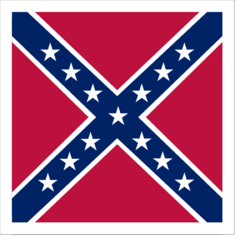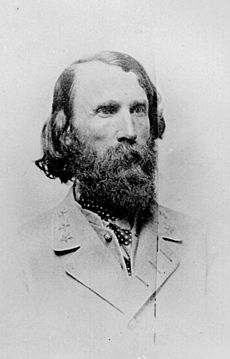Third Corps, Army of Northern Virginia facts for kids
Quick facts for kids Third Corps,Army of Northern Virginia |
|
|---|---|

Battle flag of the Army of Northern Virginia
|
|
| Active | 1863–1865 |
| Country | |
| Allegiance | |
| Branch | Infantry |
| Type | Corps |
| Size | 3 divisions |
| Part of | Army of Northern Virginia |
| Arms | Enfield rifled muskets |
| Campaigns | Civil War |
| Disbanded | April 12, 1865 |
| Commanders | |
| Commanders | Ambrose P. Hill † Henry Heth Richard Anderson Jubal Early |
The Third Corps, Army of Northern Virginia was a large group of soldiers. It was part of the Confederate Army during the American Civil War. This corps was formed in 1863 and fought in many important battles.
Contents
Forming the Third Corps
After a famous general named Thomas J. Jackson died, General Robert E. Lee changed how his army was set up. He divided his army into three main groups, called corps. The new Third Corps was given to A. P. Hill.
Hill's new corps included some of his old soldiers. It also got soldiers from other parts of the army. A new group of soldiers was also created for the corps. This made the Third Corps a strong and important part of Lee's army.
Battles of 1863
When General Lee moved his army north in June 1863, the Third Corps followed. They were heading towards Pennsylvania. On June 30, Hill sent some of his soldiers to Gettysburg to find supplies.
The Battle of Gettysburg Begins
On July 1, Hill's soldiers met Union troops. This started the huge, three-day Battle of Gettysburg. Hill's first attack was stopped by the Union army. One of his generals was even captured. Later that day, Hill's soldiers attacked again. They pushed back the Union forces.
On the second day, Hill's corps was in the middle of the Confederate line. They were supposed to attack after another corps. But only some of Hill's soldiers attacked. One general, Ambrose R. Wright, briefly broke through the Union line. However, his soldiers had to pull back. General William Dorsey Pender was badly hurt by an artillery shell.
Pickett's Charge
On July 3, parts of Hill's corps joined a famous attack called Pickett's Charge. They marched across an open field towards the Union lines. Hill's soldiers were on the left side of the attack. They faced heavy fire from the Union army.
Some of Hill's soldiers reached the stone wall on Cemetery Ridge. But they could not break the Union line. Many soldiers were hurt or captured. The attack failed, and the Confederates had to retreat.
After Gettysburg
After the battle, Hill's corps was the first to start the retreat back to Virginia. One of Hill's generals, James J. Pettigrew, was badly wounded during the retreat.
Later that year, the corps fought in the Battle of Bristoe Station. Hill attacked a Union corps but was surprised by another Union group. Hill's corps lost many men and cannons. They also took part in the Mine Run Campaign. For the winter, the soldiers stayed in camps.
Battles of 1864
In 1864, the Third Corps had over 22,000 soldiers. They fought in the Battle of the Wilderness. This was a very tough battle in thick woods. Hill's lines became mixed up. He refused to let his soldiers fix their lines overnight.
Wilderness and Spotsylvania
The next day, the Union army attacked early. Hill's soldiers were pushed back in confusion. Another Confederate corps arrived and stopped the Union attack. General Hill became sick and was replaced by General Jubal Early for a short time.
The corps then moved to Spotsylvania Court House. They held their ground against Union attacks. Hill returned to command his corps on May 21.
North Anna and Cold Harbor
At the Battle of North Anna, Hill's corps was on the left side of the Confederate army. One of his divisions attacked Union soldiers crossing a river. They thought there were only a few Union cavalry, but there were many more. The attack failed, and Hill's corps lost many men.
At Cold Harbor, Hill's corps was again on the left. Parts of his corps were moved to the right to help. On June 3, Union soldiers briefly broke through the Confederate line. But a counterattack by the Florida Brigade pushed them back.
Siege of Petersburg
After Cold Harbor, the corps rushed to the Petersburg area. They fought in the Second Battle of Petersburg. For many months, the corps defended the Confederate lines around Petersburg. They stopped several Union attacks aimed at cutting off supplies.
General Hill was sick many times during the siege. His division commanders had to take over. The corps also lost many soldiers who left the army during the winter.
Battles of 1865
In 1865, Union attacks broke through the Confederate defenses near Petersburg. General Hill was killed while trying to rally his men. General Henry Heth took temporary command. The corps then left Petersburg.
Final Battles and Surrender
The Third Corps was later combined with another corps. They served as the rear guard as the Confederate army retreated. They fought at Sailor's Creek and Cumberland Church.
For the rest of the campaign, the corps had only small fights. They surrendered with the rest of the Confederate army on April 9, 1865. This marked the end of their service in the Civil War.
 | Aurelia Browder |
 | Nannie Helen Burroughs |
 | Michelle Alexander |


